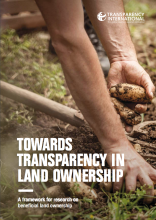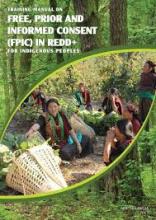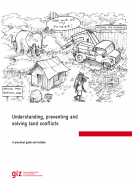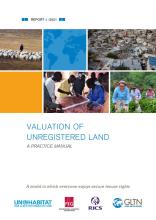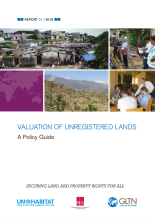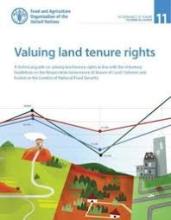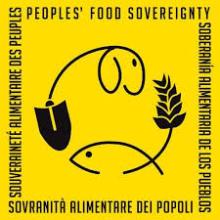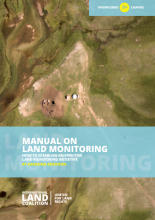Resources for Grassroots organisations
Towards Transparency in Land Ownership: A Framework for Research on Beneficial Land Ownership
In many countries, unidentified private individuals and legal entities obtain significant economic benefits from land. This lack of transparency can make it harder for affected communities and governments to hold them accountable for land use decision-making and any sort of violation they commit. It can also leave investors open to risk if they do not know who is truly behind a company they are doing business with.
Building on a methodology used to investigate beneficial ownership of legal entities for the purposes of fighting tax evasion, money laundering and corruption, this publication proposes a research framework for assessing a country’s regulation of beneficial ownership in large-scale land holdings.
Training Manual - Working on Legitimacy in Land Governance
How state and customary authorities deal with land issues has important consequences for how they are viewed by citizens. This may be particularly the case in conflict-affected settings, where displacement and return cause tenure insecurity and land disputes, and where the legitimacy of state and non-state institutions is contested. ZOA and Radboud University have developed a training manual around legitimacy and land, based on research conducted by Radboud researchers in Uganda.
The training programme presented here helps development practitioners in the land sector to become more sensitive to questions of legitimacy, and to better understand how their interventions in the land sector impact local dynamics of legitimation.
Training Manual on Free, Prior and Informed Consent (FPIC) in REDD+ for Indigenous Peoples
This manual aims to build the capacities of the indigenous peoples, networks and organizations to advocate and work for the effective implementation of FPIC for indigenous peoples in the activities and projects relating to REDD+. In particular, the objective of this manual is to equip indigenous peoples with the knowledge and understanding of FPIC and REDD+; and to provide a general guide to communities on the application of FPIC in REDD+ activities in upholding their rights, interests and welfare. This manual is targeted for indigenous leaders, members of IP organizations and communities, activists, and advocates in general. It is particularly intended for indigenous educators, trainers and facilitators working with indigenous organizations and communities, especially those to be affected by REDD+
Training materials for indigenous peoples' and local communities' advocates
These learning modules provide training material for Indigenous Peoples’ and local communities’ advocates on how to operationalise benefit-sharing and concluding benefit-sharing agreements. There are three modules covering these broad issues in relation to natural resources, traditional knowledge and farmers' rights.
This resource is part of the CCSI’s Directory of Community Guidance on Agreements Relating to Agriculture or Forestry Investment.
Understanding, preventing and solving land conflicts: A practical guide and toolbox
This guide is intended for practitioners who are confronted with land conflicts in the course of their work or are in a position to prevent them and/or include land governance as one pillar in their policies. It aims to broaden the understanding of the complexity of causes that lead to land conflicts in order to provide for better-targeted ways of addressing such conflicts, and provides a number of tools with which to analyse land disputes. In addition, this guidebook discusses a wide variety of options and tools for settling ongoing land conflicts and for preventing new ones. It adopts a gender-sensitive approach.
Valuation of Unregistered Land – A Practice Manual
Value, and its attribution to unregistered land, is important information for effective land acquisition, taxation and transfer processes and a key component of land administration systems.
This manual presents a practical approach to the valuation of unregistered land. It is designed to aid implementation of Valuation of Unregistered Lands: A Policy Guide, prepared by the Global Land Tool Network for the United Nations Human Settlements Programme (UN-Habitat), in combination with the international valuation standards of the International Valuation Standards
Council. The manual comprises two parts. The first gives an overview of recommendations related to the valuation of unregistered land rights, and the second provides more detail about what to consider when working in this complex environment.
Valuation of Unregistered Lands: A Policy Guide
This guide aims to support the process of valuation of unregistered land and property for the public and private agencies that undertake this exercise. It will be relevant for policy makers, local authorities, international finance institutions, investors, property developers, banks, civil society organisations, citizens, land owners, local communities and women’s groups.
Valuing land tenure rights
This technical guide covers the issues associated with the identification and valuation of tenure rights for different purposes, and provides guidance on how to ensure that valuations are undertaken in a fair, reliable and transparent manner that comply with international norms. It explains why valuations are important, where and when they should be used, and by whom. The guide aims to raise the level of awareness of valuation issues and procedures among those involved in land policy and administration and those affected by land tenure decisions.
VGGT: Fold-out User Guide to the analysis of governance, situations of human rights violations and the role of stakeholders in relation to land tenure, fisheries and forests, based on the Guidelines
This guide provides tools to understand the Voluntary Guidelines on the responsible Governance of Tenure, which sometimes uses technical language that is not easy to understand for those who are not used to reading this kind of text.
VGGT: Manual on Land Monitoring. How to establish an effective land monitoring initiative
Guide to determine if monitoring is actually a viable activity that can be undertaken by their organisation. Choosing to undertake monitoring is dependent on considerations such as evaluating the sufficiency of resources, capacity to design a sound monitoring system, and availability of political windows to effect change, amongst others.


